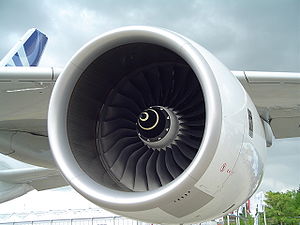 Image via Wikipedia Official to AP: Rolls-Royce replacing A380 engines
Image via Wikipedia Official to AP: Rolls-Royce replacing A380 engines11/15/2010 11:58 AM
38m ago
Rolls-Royce will temporarily replace entire engines suffering from oil leaks on the world's largest jetliner after one motor suffered a frightening midair disintegration, an aviation regulator told The Associated Press on Monday.
By Michael Weissenstein, Associated Press
LONDON — Rolls-Royce will temporarily replace entire engines suffering from oil leaks on the world's largest jetliner after one motor suffered a frightening midair disintegration, an aviation regulator told The Associated Press on Monday.
The official said the British engine-maker would take off faulty engines and replace them with new ones. It will then fix the leaking part and swap the engine back again.
The official, who has been briefed by Rolls-Royce and some of the affected airlines, spoke on condition of anonymity because of the sensitivity of the matter. Rolls-Royce declined to comment.
Leaking oil caught fire on Nov. 4 in one of the Qantas A380's four massive Trent 900 engines, heating metal parts and causing the motor's disintegration over Indonesia before the jetliner returned safely to Singapore. Experts say chunks of flying metal damaged vital systems in the wing of the Sydney-bound plane, causing the pilots to lose control of the second engine and half of the brake flaps on the damaged wing in a situation far more serious than originally portrayed by the airline.
Qantas grounded its six A380s within hours and said four days later that checks had revealed suspicious oil leaks in three engines on three different grounded A380s.
Singapore Airlines and Lufthansa, which both use A380s with Trent 900 engines, have conducted checks on their superjumbos and all but one have returned to service, the airlines say.
Qantas' six superjumbos — the backbone of its longest and most lucrative international routes between Australia and Los Angeles, Singapore and London — remain grounded despite what experts say is financial pressure to fly them again. The removal of engines can be expected to cause longer delays and potential revenue losses.
"We are taking our normal and extremely conservative approach to safety and will not operate our A380 fleet until we are completely confident that it is safe to do so," Qantas spokesman Simon Rushton said.
It was not immediately clear what effect the replacement program would have on airlines expecting deliveries of new A380s, although Airbus said last week that the Trent 900 problems could be expected to delay deliveries.
Airbus spokesman Justin Dubon directed questions to Rolls Royce and said, "We're helping with the investigation in order to minimize disruption to customers."
Qantas was still hopeful of returning the A380s to service "in days, not weeks," Rushton said.
Britain's Rolls-Royce Group PLC, the world's second-largest engine maker, said Friday that it would be replacing an unspecified module, or collection of linked parts, on the Trent 900. Airbus said Rolls-Royce would also be equipping the engines with software to shut them down before an oil leak could cause an engine to disintegrate.
Rushton said three engines had been removed from Qantas A380s as part of a detailed inspection program ordered by Europe's air safety regulator and recommendations by Rolls-Royce.
Singapore Airlines, which grounded three of its 11 A380s after checks found oil leaks in three Trent 900s, said Monday that two were back in service after engine changes and that work was continuing on the third.
"We can't speak definitively about the number of engines that may ultimately require modification work as it needs to be stressed that investigations are continuing," Singapore Airlines spokesman Nicholas Ionides said.
Lufthansa declined immediate comment.

No comments:
Post a Comment